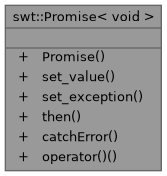Template specialization for void-returning promises. More...
#include <Promise.h>

Public Member Functions | |
| Promise () | |
| Default constructor for void promise. | |
| void | set_value () |
| Mark void promise as completed. | |
| void | set_exception (std::exception_ptr exception) |
| Reject void promise with an exception. | |
| template<typename F > | |
| auto | then (std::shared_ptr< SLLooper > &looper_, F func) -> Promise< std::invoke_result_t< F > > |
| Chain continuation callback for void promise completion. | |
| template<typename F > | |
| auto | catchError (std::shared_ptr< SLLooper > &looper_, F func) -> Promise< void > |
| Chain error handler for void promise rejection. | |
| void | operator() () |
| Function call operator for convenient void promise resolution. | |
Detailed Description
Template specialization for void-returning promises.
This specialization handles promises that represent completion of operations without returning values. Uses std::monostate internally to represent the "no value" state while maintaining the same API as value-returning promises.
Key differences from general template:
- set_value(): Takes no parameters (represents completion)
- Continuation signature: Functions take no parameters
- Internal state: Uses State<std::monostate> instead of State<tValue>
- API consistency: Same chaining and error handling patterns
- Note
- Specialization maintains API consistency with value-returning promises
- std::monostate used internally to represent completion state
- See also
- Promise, State<std::monostate>
Constructor & Destructor Documentation
◆ Promise()
| swt::Promise< void >::Promise | ( | ) |
Default constructor for void promise.
Creates a void promise using State<std::monostate> for internal state management while providing a clean void interface.
- Note
- Implementation in Promise.tpp
Definition at line 7 of file Promise.cpp.
Member Function Documentation
◆ catchError()
| auto swt::Promise< void >::catchError | ( | std::shared_ptr< SLLooper > & | looper_, |
| F | func | ||
| ) | -> Promise< void > |
Chain error handler for void promise rejection.
- Template Parameters
-
F Function type for error handler callback (auto-deduced)
- Parameters
-
looper_ SLLooper instance for callback execution func Error handler function that receives std::exception_ptr
- Returns
- Promise<void> New void promise for further chaining
Registers an error handler for void promise rejection. If the error handler executes successfully (without throwing), the promise chain continues with success state.
- Note
- Implementation in Promise.tpp
- Error handler signature same as general template
◆ operator()()
|
inline |
Function call operator for convenient void promise resolution.
Convenience operator that allows using the void promise as a callable object for completion marking. Equivalent to calling set_value().
Definition at line 355 of file Promise.h.
References swt::Promise< tValue >::set_value().

◆ set_exception()
| void swt::Promise< void >::set_exception | ( | std::exception_ptr | exception | ) |
Reject void promise with an exception.
- Parameters
-
exception Exception pointer to reject the promise with
Identical behavior to general template - sets promise to failed state and triggers error handlers.
- Note
- Implementation in Promise.tpp
- Thread-safe operation
Definition at line 13 of file Promise.cpp.
◆ set_value()
| void swt::Promise< void >::set_value | ( | ) |
Mark void promise as completed.
Resolves the void promise by marking it as completed and triggering any registered continuation callbacks. No value is provided since this represents operation completion.
- Note
- Implementation in Promise.tpp
- Thread-safe operation
Definition at line 9 of file Promise.cpp.
◆ then()
| auto swt::Promise< void >::then | ( | std::shared_ptr< SLLooper > & | looper_, |
| F | func | ||
| ) | -> Promise< std::invoke_result_t< F > > |
Chain continuation callback for void promise completion.
- Template Parameters
-
F Function type for continuation callback (auto-deduced)
- Parameters
-
looper_ SLLooper instance for callback execution func Continuation function (takes no parameters)
- Returns
- Promise<ReturnType> New promise for further chaining
Registers a continuation callback that executes when the void promise completes. The continuation function takes no parameters since void promises don't produce values, but can return any type.
- Note
- Implementation in Promise.tpp
- Continuation signature is F() not F(void)
The documentation for this class was generated from the following files:
- include/Promise.h
- src/Promise.cpp